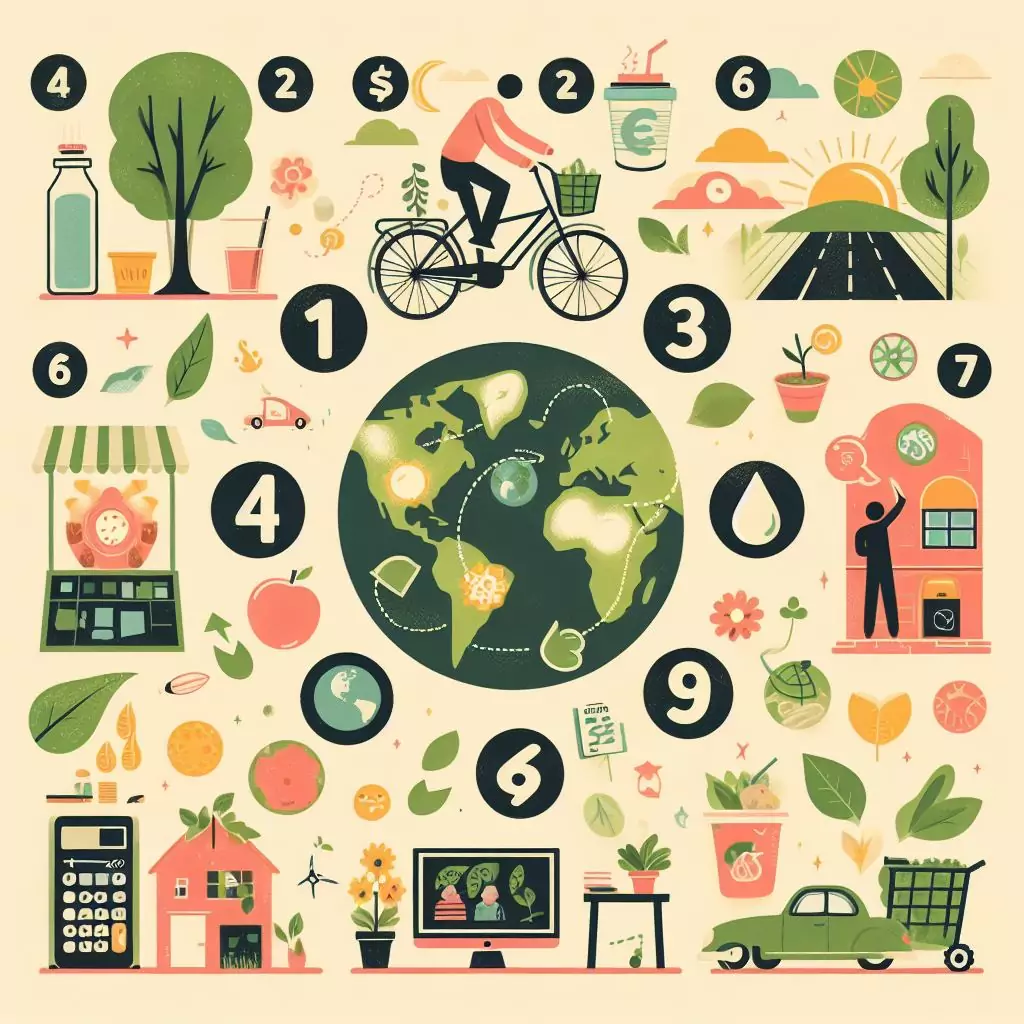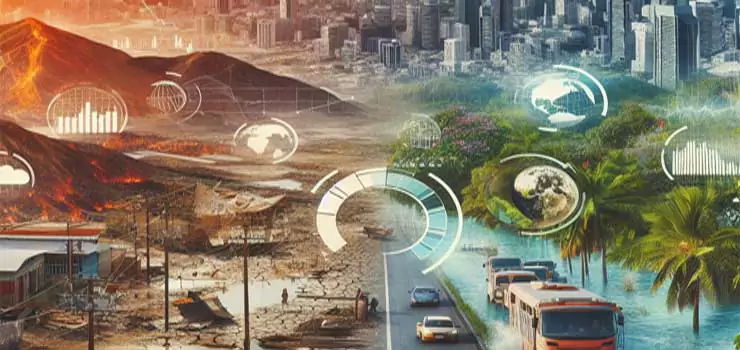Table of Contents
Introduction
Climate change is one of the most pressing issues of our time, posing significant challenges to the environment, economy, and society. While the scale of the problem may seem daunting, individuals have the power to make a meaningful impact through their everyday choices and actions.
Understanding Climate Change
Climate change refers to long-term shifts in temperature, precipitation, and other atmospheric conditions that result from human activities, primarily the burning of fossil fuels and deforestation. These changes have far-reaching consequences, including rising sea levels, extreme weather events, and disruptions to ecosystems.
How to stop climate change?
Stemming the tide of climate change demands a vibrant tapestry woven from threads of individual and collective action. Transitioning from fossil fuel dependence to embracing renewable energy sources like solar and wind is the warp powering our progress towards a decarbonized future. Yet, the weft of this tapestry is equally vital, intricately woven with nature’s allies – forests that gulp down carbon dioxide and oceans that cradle warming waters. Protecting these verdant lungs and azure guardians is not mere eco-piety but a strategic manoeuvre in the climate battle.
Furthermore, each thread, no matter how fine, adds strength to the fabric. Reducing our reliance on cars, embracing sustainable diets, and minimizing waste – these seemingly small steps, multiplied by billions, become a potent force for change. And let us not forget the threads of advocacy and policy, urging our leaders to enact carbon pricing, invest in green infrastructure, and forge international cooperation.
The Role of Individuals
Individual actions, when combined, can have a substantial impact on mitigating climate change. From reducing carbon footprint to advocating for policy changes, individuals play a crucial role in shaping a sustainable future for the planet.
Reducing Carbon Footprint
One of the most effective ways individuals can combat climate change is by reducing their carbon footprint. It can be achieved through simple changes such as using energy-efficient appliances, reducing meat consumption, and minimizing waste.
Energy Conservation
Energy conservation is another key aspect of individual climate action. By adopting energy-saving practices at home and work, such as using LED light bulbs, turning off electronics when not in use, and properly insulating buildings, individuals can contribute to lower greenhouse gas emissions.
Promoting Renewable Energy
Supporting and using renewable energy sources, such as solar and wind power, is essential for transitioning to a low-carbon economy. Individuals can install solar panels, purchase renewable energy credits, or choose energy providers that prioritize renewable sources.
Sustainable Transportation
Transportation accounts for a significant portion of global carbon emissions. Individuals can reduce their impact by walking, cycling, carpooling, or using public transportation whenever possible. Electric vehicles also offer a cleaner alternative to traditional gasoline-powered cars.

Waste Management
Proper waste management is crucial for reducing methane emissions from landfills and minimizing the environmental impact of waste. Individuals can recycle, compost, and avoid single-use plastics to contribute to a more sustainable waste management system.
Advocacy and Education
Spreading awareness about climate change and advocating for sustainable practices in communities can amplify individual efforts. By educating others and participating in local initiatives, individuals can inspire collective action for a greener future.
Policy and Governmental Support
Individuals can influence climate policy through engagement with elected officials, participating in public forums, and supporting organizations that advocate for climate action. By voicing their concerns and voting for environmentally conscious leaders, individuals can contribute to policy changes at local, national, and global levels.
Also Read About 10 Business Trends for 2024 and Forecasts for 15 Industries
Impact on Future Generations
The actions we take today will have a profound impact on future generations. By considering the long-term consequences of our choices, we can work towards leaving a positive legacy for the planet and its inhabitants.
Challenges and Solutions
While the challenges posed by climate change are significant, there are viable solutions available. Innovations in technology, changes in consumer behaviour, and policy interventions offer hope for addressing climate change effectively.
Global Collaboration
Addressing climate change requires cooperation on a global scale. Individuals can support international efforts through initiatives like the Paris Agreement and by advocating for policies that promote global cooperation on climate action.
Best Ways To Stop Climate Change
As an individual, you can make a difference in stopping climate change by taking actions that reduce your carbon footprint and support the transition to a low-carbon society. Some of the possible ways to stop climate change are:
- Switch to renewable energy sources, such as solar panels or wind turbines, for your home or business, or choose a green energy provider that offers clean electricity.
- Improve your energy efficiency and conservation such as installing insulation, sealing air leaks, and using smart power strips to lower your energy bills and emissions.
- Reduce your waste and recycle, such as buying reusable bags, bottles, and containers and sorting your trash into recyclable and compostable materials to prevent waste from ending up in landfills or incinerators.
- Plant trees and restore natural habitats, such as joining a community garden, volunteering for a conservation project, or donating to an environmental organization to help sequester carbon and protect biodiversity.
- Change your transportation and travel habits, such as biking, walking, carpooling, taking public transit, or opting for trains, buses, or electric vehicles, to reduce your reliance on fossil fuels and your emissions.
- Eat less meat and more plant-based foods, such as adopting a vegetarian, vegan, or flexitarian diet or choosing organic, local, and seasonal produce, to lower your demand for animal products and your emissions from food production.
- Support policies and initiatives, such as signing petitions, joining campaigns, contacting your representatives, or voting for candidates who advocate for climate action and justice at the local, national, and global levels.
FAQs
What is the biggest contribution individuals can make to fight climate change?
One of the most significant contributions individuals can make is reducing their carbon footprint by adopting sustainable practices in their daily lives.
How can individuals influence climate policy?
Individuals can influence climate policy by engaging with policymakers, participating in advocacy campaigns, and supporting candidates and policies that prioritize climate action.
What role does renewable energy play in combating climate change?
Renewable energy sources, such as solar and wind power, offer a cleaner alternative to fossil fuels and play a crucial role in reducing greenhouse gas emissions.
Why is it important to consider the impact on future generations when addressing climate change?
Considering the impact on future generations emphasizes the long-term consequences of our actions and motivates us to make decisions that will benefit future inhabitants of the planet.
How can individuals encourage others to take action on climate change?
Individuals can encourage others to take action on climate change by leading by example, sharing information and resources, and engaging in constructive conversations about the issue.
Conclusion
In conclusion, individuals have the power to make a difference in the fight against climate change. By making conscious choices in their daily lives, advocating for change, and supporting sustainable initiatives, individuals can contribute to a more resilient and sustainable future for the planet. londonbtimes.com
Remember, climate change is not a monolithic foe but a hydra subdued through a multitude of coordinated actions. So, let us pick up our needles, weave our threads of change, and together, stitch a future where humanity and nature thrive in vibrant harmony.




